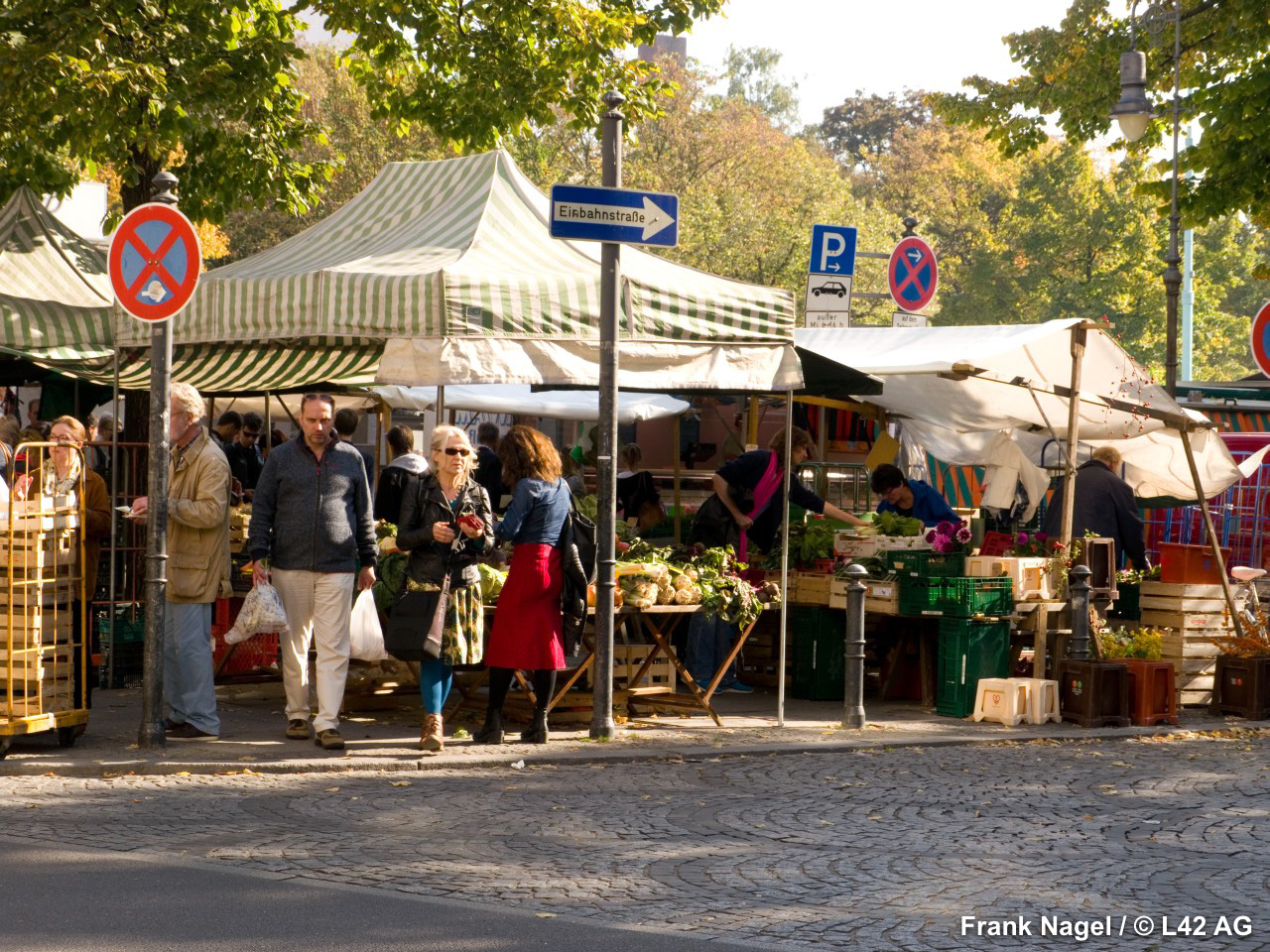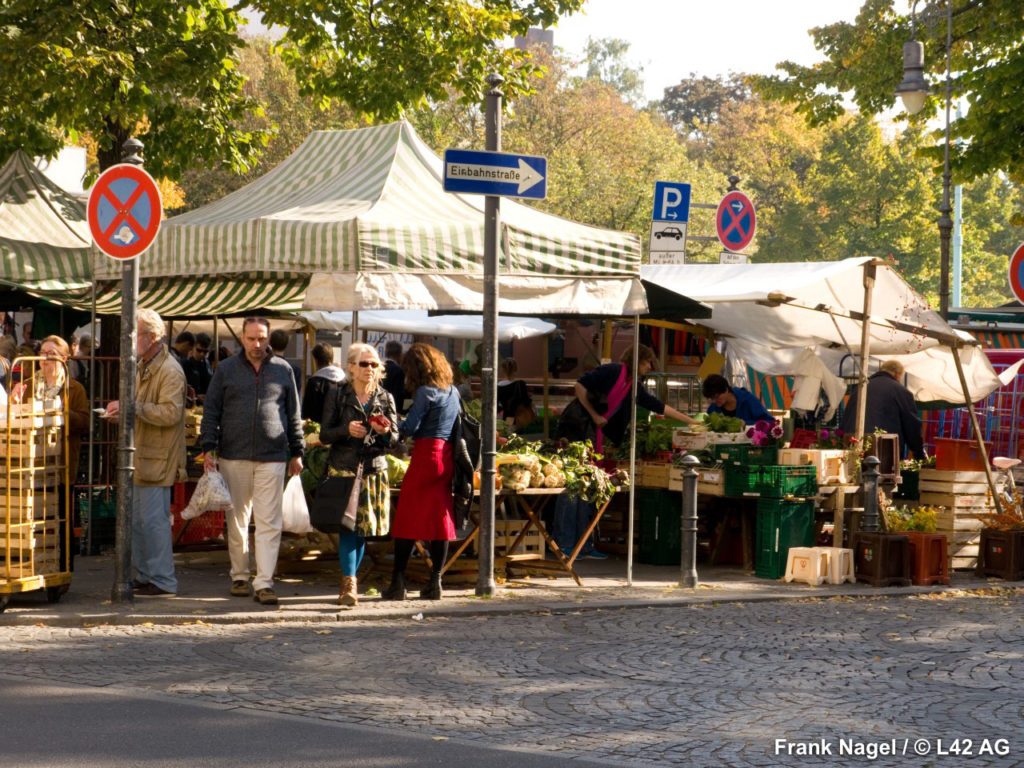
From Nollendorfplatz U-Bahn station we cross the stretch of Maaßenstraße in large strides, the rich mixture of the typical smells of cheap takeaway Berliner food – pizza, kebab, sausage, Chinese stir fry, and Middle Eastern vegan food – following us all the way to the square.
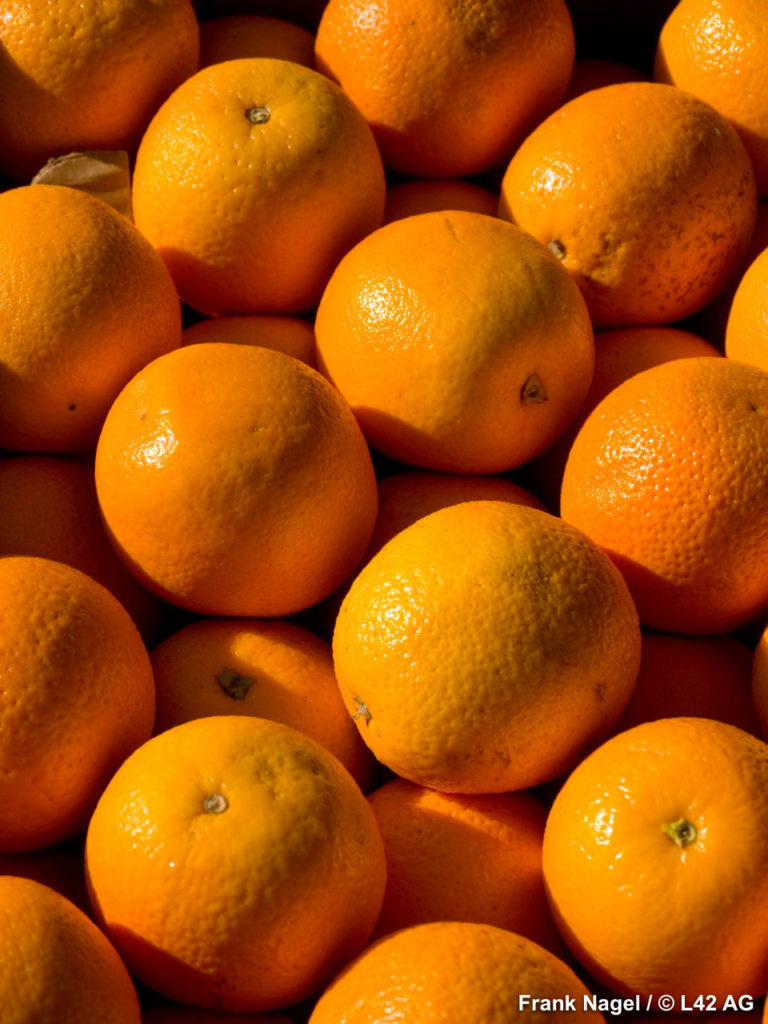
Our point of entrance shall be the gate of oranges, which isn’t a monument, but a pleasantly odiferous curtain provided by the busy stand of freshly squeezed juices. Attracted by the colors of flowers, we veer off to the left and hope that the roses do indeed smell. Roses which do, of course, in this day and age are rare, but the pink, violet, yellow, and white hyacinths emit a mixture of sweet notes of varying strengths. We immediately arrive at the stand selling aromatic oils and incense with its classic smells of burnt charcoal and its coils of Himalayan scents. But even more tenacious then the Himalayan smoke is the smell of the cheeses.
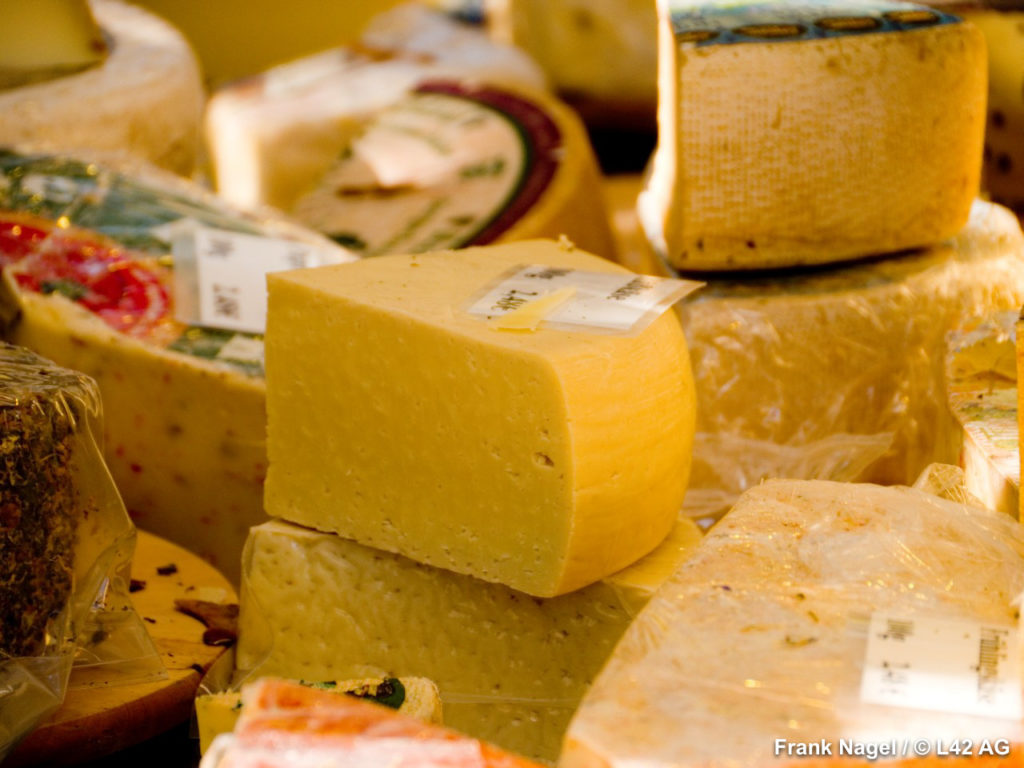
Who knows how long the scarves on sale next door will carry these smells with them! Next we find a leather artisan sandwiched between two fish stands and in front of him there is a stand selling fresh toasted bread with butter and organic cheeses, without a doubt one of the most fragrant points of the entire square. Contrasting these forces of nature, however, is a knife grinder with his blowtorch and the dry smoke of singed tools.
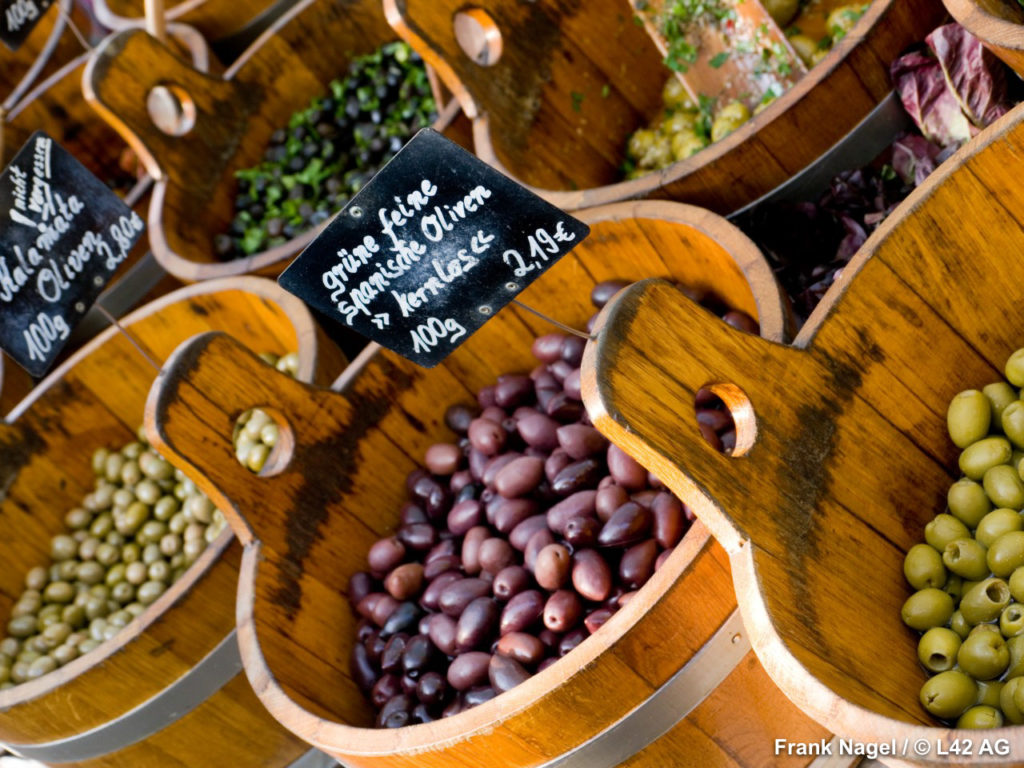
After that we encounter the wonderful smell of olives together with that of untreated sheepskins, which, they say, are good for your health, but here just smell of the sheep pen. In this tiny space you’d think you were in Greece and, in fact, right on time, upon the breeze comes the delicate smell of roasted fish.
Having arrived at the end of the intense left-hand corridor, we shall now make our way back up the right-hand side towards the center of the square. Finally! The smell of fresh vegetables! But first we must begin with the smell of Turkish börek, those filo dough pastries filled with fresh, slightly sour cheese and spinach or meat. The smell becomes more powerful as we near the peppers and eggplant simmering in their huge roasting pans. The fragrances of the Middle East, however, soon cede to those emanating from the stand selling naturally made wax and honey candles, which manage to reestablish a little corner of odoriferous German autonomy. Right next to the honey stand is one selling leather goods: wallets, bags, keychains, and, most importantly from an aromatic point of view, long shoelaces hung in clusters. Then more leather. This time gloves. It’s almost like being in Florence! In front of the gloves we encounter the freshest fragrances of the entire market: local apples, potatoes, and parsley. The apples are full of character and, above all, have an extremely delicate and wonderful smell.
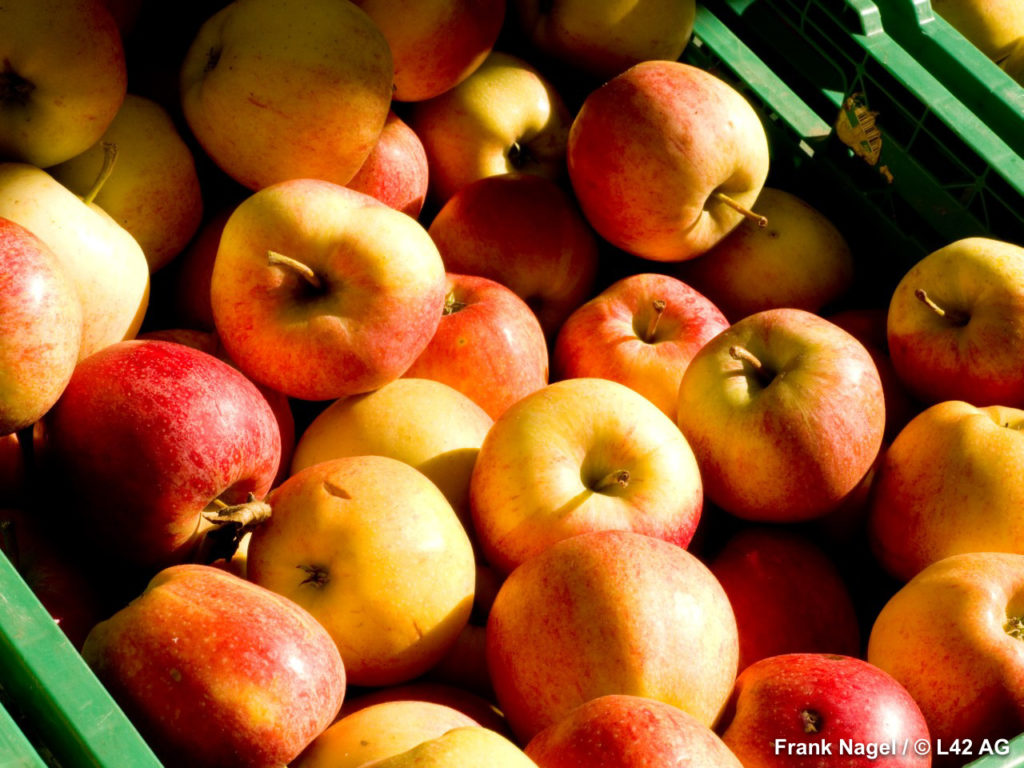
The parsley pays them homage and the potatoes smell of fresh earth. A truly harmonious trio! Next to this wonderful stand there are more local farmers and all the smells remain deliciously light and fresh.
Now we are by St. Matthews’ Church, one of the few Catholic churches in Berlin. Let’s go inside. If we close our eyes, we are immediately in Rome. There is that warm smell of lit candles and a delicate afterglow of incense. The baptismal font is dry, but the holy water which once was there has left a part of its essence. It really is incredible to think that even this far away from the Vatican you can find such a precise olfactory impression. Indeed, this is what Catholic means, the universal church: a perfect brand, one of the best examples of franchising ever accomplished by humankind. Interestingly enough, behind the church is the largest Buddhist stand of the entire market, and there the odor of incense is even stronger than inside the church.
But now let us turn back in the direction of the U-Bahn and walk along the outermost right-hand side of the market where there are the large Turkish fruit stands. Here the merchandise isn’t strictly seasonal and is all imported. There are the exotic smells of melon, papaya, mango, avocado, and strawberries. A particularly sublime smell comes from the dried bananas, apricots, prunes, figs, raisins, and melons…The smell goes straight to your brain and gives you the immediate feeling of wellbeing, maybe taking you straight back to sugary memories of earliest childhood. Nuts of every kind keep watch over the dried fruit and protect this olfactory Eden from any assault. The plants which really would like to be noticed, however, really don’t stand a chance next to the powerful smell provided by the stands offering up Thüringer Bratwurst and its inseparable partner mustard. After that, we find a truck selling at least ten different types of German potatoes and once again the smell of earth and lots of people standing in line. The German flag of fruits and vegetables, the agricultural symbol of national unity, however, is always a bunch of Suppengrün. This German version of mirepoix is fixed in its make up: just parsley, carrots, leek, and turnips. Though foreigners might find it a little odd, you’ll recognize the true German by the degree to which they give tribute to the Suppengrün.
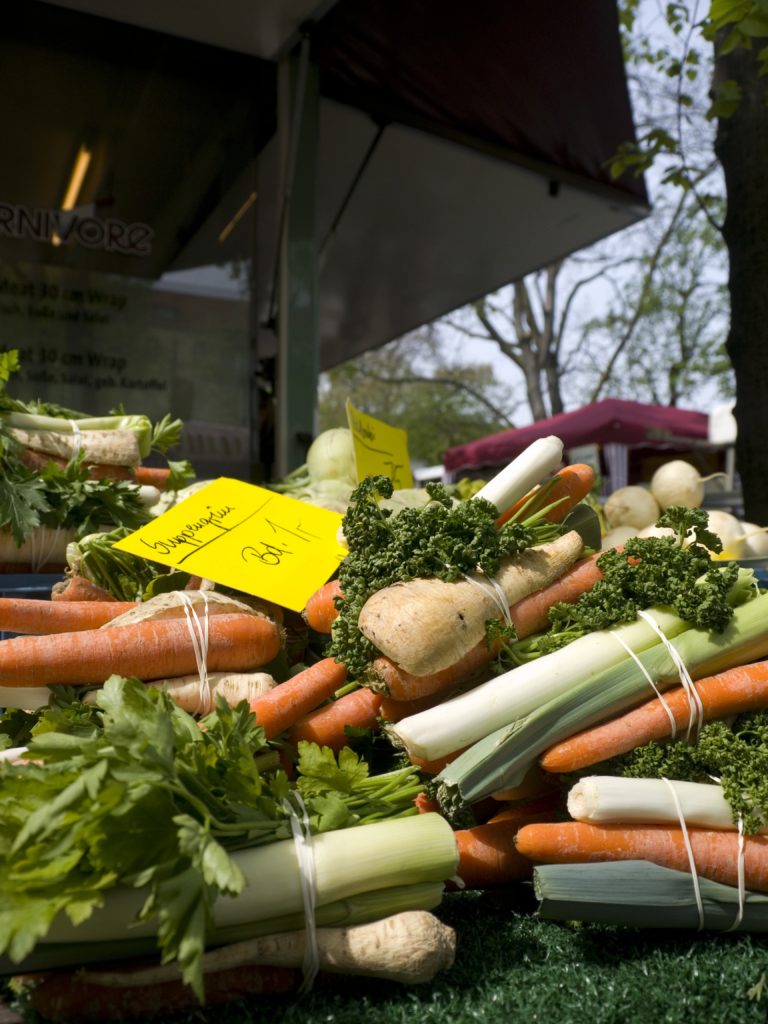
Up next is a woodworker who makes bowls and cutting boards out of only maple and linden. What a lovely surprise! Who knows, carrying it home might create the sensation of walking along Unter den Linden…well, assuming that was a pleasant memory for us, of course, as that enchanting avenue has been undergoing a kind of disembowelment that is to transform it forever for months. In short, Unter den Linden has become a nightmare. Whoever travels along the U6 subway line has to get off between the stations of Friedrichstraße and Französische Straße and confront the eviscerated street. Whoever passes by with the bus has to change directions. Whoever rides through on their bike has to weave between tourists and scaffolding, and whoever is simply walking often just feels uncomfortable. A bowl made of sweet linden wood, now that we think about it, might actually ruin our day.
Well, be that as it may, we are now beneath a picturesque, white and gold-fringed Turkish umbrella with two men dressed a la “Thousand and One Nights” who are offering up Turkish tea and an incredible spiced coffee made by simmering the sugar in the cup directly over the flame and whose fragrance, and sweet and spiced aftertaste, bring us to Persia. A different smell comes from the Turks who are making fresh apple, carrot, grapefruit, and orange juice: the smell of health and optimism, the smell promising us we will never, ever become oxidized.
And it is with this lovely hope that we leave the market, but not before having our shoes shined with the purest, most delectable smelling virgin beeswax. Without any doubt the best gift our shoes have ever received!
We shall leave precisely the way we came in, through the curtain of oranges, but somehow we are different than we were before. These smells have brought us to other countries and back to memories of things past.
But now let’s get back on the U-Bahn and jump over just one stop to Wittenbergplatz. A smaller market takes place there every Tuesday, Thursday, and Friday, but today is Saturday and we have come to visit the famous KaDeWe, or Kaufhaus des Westens (Department Store of the West), which opened in 1907.
Translated by Alexander Booth
